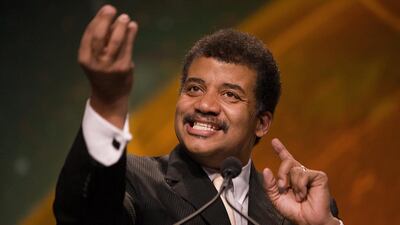DUBAI // While much of the opening day of the summit looked at moving forward in trying times, noted US scientist Neil deGrasse Tyson took a moment to look back at the history of the Arab world.
In his talk Science of Today: Technology of Tomorrow, Mr deGrasse Tyson, director of the Hayden Planetarium at the American Museum of Natural History, discussed the advances made during the Golden Age of Islam.
“Science pride and scientific literacy pushed the Arab world to make several significant innovations in the fields of astronomy, algebra, navigation and maths,” he said.
“Over two-thirds of all stars have Arabic names and the words algebra and algorithm find their origins in the Arabic word al jabr. If the region had sustained this pace of discovery, it would have produced Nobel Laureates every year.”
The astrophysicist highlighted several examples of technological advances rooted in scientific discoveries made over the past century, and spoke for a culture of exploration as the foundation of modern-day innovation.
Mr deGrasse Tyson drew parallels between the US in 1960s, which was termed the “Time of Technological Hope” and the present day UAE.
Similarities began with the two nations sitting at the cusp of launching important space missions, for which the backbone is scientific discoveries that lead to technological innovation, he said.
He said science was an endless frontier and its power and potency knew no boundaries in its ability to serve governments.
Mr deGrasse Tyson gave the examples of prominent scientific agencies such as the National Institutes of Health, the European Organisation for Nuclear Research and Nasa, which are backed by governments from across the world.
He urged governments to give priority in their budgets for research and development to fuel scientific advancement.
newsdesk@thenational.ae

